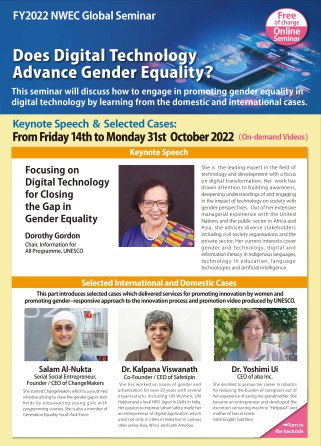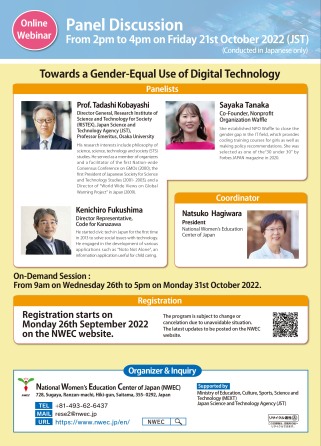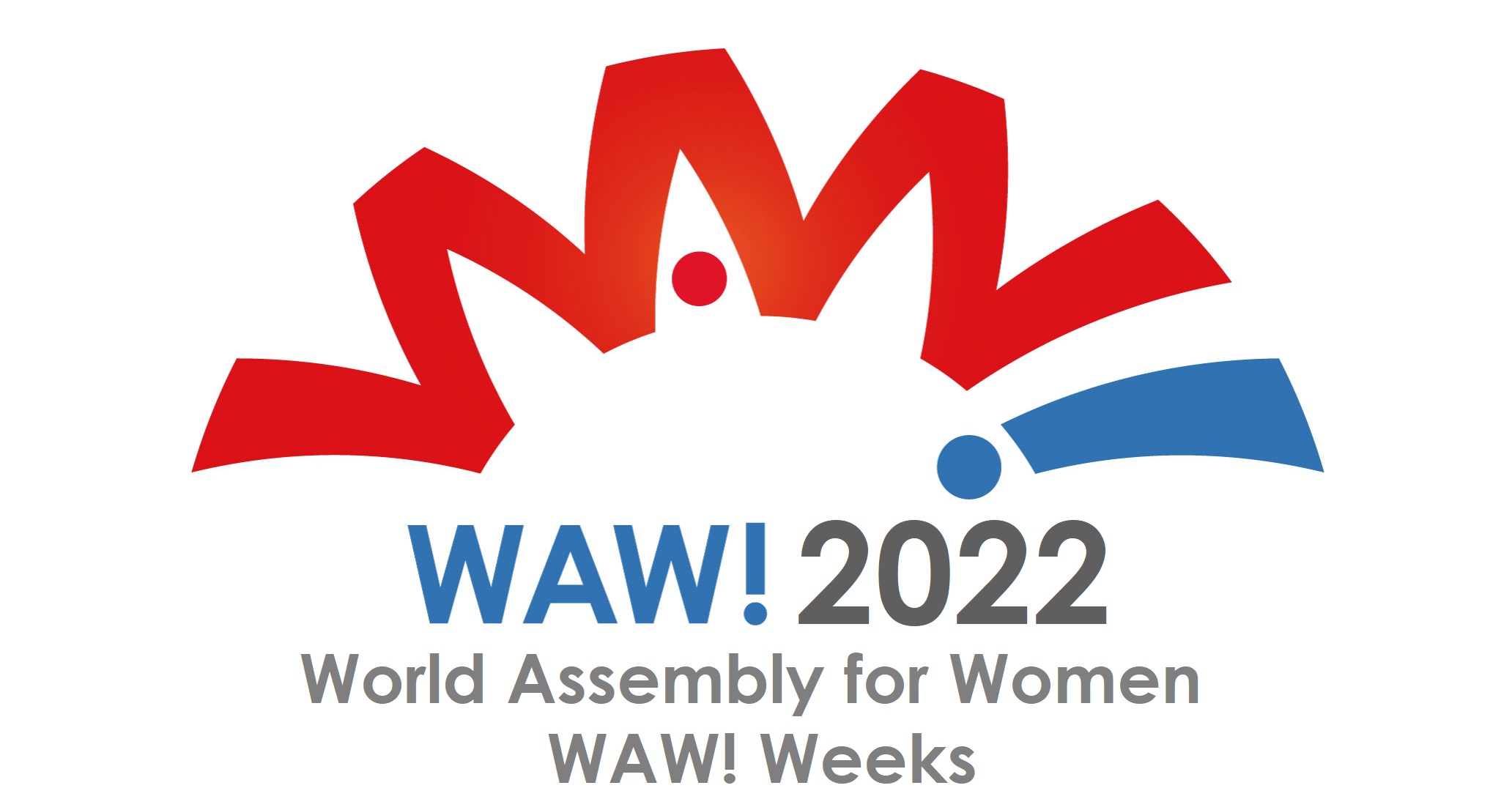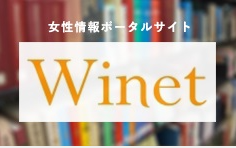International Cooperation
- HOME
- International Cooperation
- NWEC Global Seminar
- FY2022 NWEC Global Seminar: Does Digital Technology Advance Gender Equality?
NWEC Global Seminar
- Event Report
-
FY2022 NWEC Global Seminar: Does Digital Technology Advance Gender Equality?
Date:From Friday 14th to Monday 31st October 2022
Place:Online /
From Friday, 14th to Monday 31st October 2022, National Women’s Education Center (NWEC) held FY2022 NWEC Global Seminar on the theme of ‘Does Digital Technology Advance Gender Equality?’.
This year’s seminar featured on-demand videos of the keynote speech and introduction of selected cases from Japan and overseas, and live streaming of the panel discussion.
As the ICT pervades our daily lives, it has become essential to reconsider digital technology and innovations initiatives from the perspective of gender and to incorporate more diverse needs and requirements. Evidentially, the priority theme of the 67th UN Commission on the Status of Women (CSW), to be held in 2023, is also “Innovation and technological change, and education in the digital age for achieving gender equality and the empowerment of all women and girls.” This seminar presented insights and discussions by selected speakers who are active in various fields and aspire to innovate and develop digital technology that would contribute to the advancement of gender equality while taking into account its diverse needs.
●Keynote Speech: Focusing on Digital Technology For Closing the Gap in Gender Equality (31 minutes)
Ms. Dorothy Gordon, Chair of Information for All Programme, UNESCO
The keynote speech covered topics ranging from challenges in promoting gender equality to opportunities and challenges in technologies. It also highlighted that the technology was neither inherently good nor bad and it was a mirror that reflects ambitions and intentions of the people. As the opportunities of the digital technology to close the gender gap were described such that data enabled quick research, and the online tools made retraining and upskilling accessible. It also drew our attention to the issues with regard to further promote human resource development to eliminate algorithm bias, and the issue of surveillance capitalism. Ms. Gordon ended her speech with a call for the audience to take action for themselves in order to create the society they want.
●Selected Cases from Japan and overseas
AI and Gender (1 minute)
United Nations Educational, Scientific and Cultural Organization (UNESCO)
This video presented the issues of gender bias in AI, the fact that the vast majority working in machine learning or AI are men; and the need for diversity in AI in order to build a resilient and prosperous society. On this occasion, NWEC made Japanese subtitles of this video in collaboration with UNESCO.
Building Safe and Gender Friendly Cities (18 minutes)
Dr. Kalpana Viswanath, Co-Founder / CEO of Safetipin
Dr. Viswanath shared an initiative in India and around the world for safety in urban public spaces, such as public roads and bus stops. The responsibility for unpaid care work in India and worldwide falls disproportionately on women involved in raising children, housework and chores, nursing care, etc., and ensuring safe mobility without the risk or fear of violence will protects women’s rights to work and study. The presentation introduced how data collected from the bottom up, using the 'Safetipin' app developed for women's safe mobility, is being used by the governments, researchers and NGOs to help empower women.
Empowerment of Women and Girls through Computer Programming (14 minutes)
Ms. Salam Al-Nukta, Founder / CEO of ChangeMakers, a member of Generation Equality Youth Task Force
Ms. Al-Nukta shared her experience of establishing ChangeMakers in 2016 to provide IT education for young people in Syria. In particular, she mentioned how having everyone, including women, participate in technological development leads not only to job creation and economic growth but also to social change and peace building. It was also shared that she organized the courses for both men and women in the same environment in order to close the gender gap in the field of digital technology. Ms. Nukta described the strategy of involving students’ family and community to overcome the social norm such as ‘Technology is for boys’ and ‘If a girl studies science and technology she will neglect the home,’. She proudly reported that ChangeMakers enabled more girls to make informed decisions about pursuing academic and career paths in technology.
Attempting to Bring About Change in the Field of Caregiving through Robotics Technology
Dr. Yoshimi Ui, CEO of aba Inc.
Ms Ui shared her experience developing and commercializing nursing care robots to create a society in which technology makes everyone willing to engage in care work. From her own experience of caring for a family member, she carried out research on nursing care robots that reduce the burden on caregivers, developed the Helppad, a sheet fitted with sensors to detect odors, and is promoting care-tech that, by using AI to predict excretion patterns from data recorded in the Cloud, will reduce the burden on both caregivers and those they care for. In order to ‘build a society where careers aren’t stopped by childrearing or nursing care’ she promotes the working environment in which all employees can continue to work regardless of their responsibility at home, and showcased initiatives aimed at using technology to tackle the challenges in aging society.
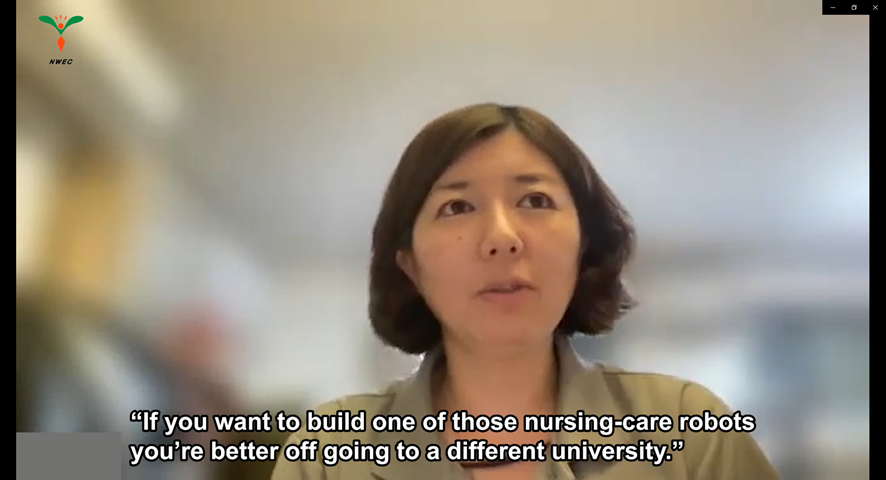
●Panel Discussion: Towards a Gender-Equal Use of Digital Technology

Referring to Keynote Speech and Selected Cases, three Japanese panelists from academia, education sector particularly for girls and women and civil society to apply ICT for solving social issues discussed what is our role to advance gender equality as digital technology pervade into our daily lives. The president of NWEC, Natsuko Hagiwara coordinated the discussion.
Prof. Tadashi Kobayashi, Director-General of the Research Institute of Science and Technology for Society (RISTEX) at the Japan Science and Technology Agency (JST) and Professor Emeritus of Osaka University, emphasized the point that RISTEX is funding research that integrates the humanities and sciences, and that femtech research is the meaningful study considering the women make up half of the population. He also mentioned gender shades issues which algorithmic bias with regard to race and gender manifested in the accuracy of facial recognition by AI.
Ms. Sayaka Tanaka, co-founder of Nonprofit Organization Waffle, presented data showing that while there was no apparent gender difference in interest in computers at elementary school, in middle- and high-school students the male:female ratio dropped to 20:1, and that there are few females interested in entering the department of engineering in university, or in working in the field of IT; and she raised the issue that girls’ career choices were affected by such bias. She described the change in the awareness and behavior of female students who have participated in the ICT learning opportunities for female students provided by Waffle, and shared how the knowledge gained from their activities also leads to policy recommendations.
Mr. Kenichiro Fukushima, Director Representative of Code for Kanazawa, defines Civic Tech as ‘Actions by local citizens to create the society we want, and the technology itself needed for the actions’. Giving the example of a software app providing useful childrearing information that was developed mainly by mothers, he described the common feature of Civic Tech as using technology to solve problems by looking at social issues as what we ourselves have something to do. In addition, he also explained the role of gender tech in solving all kinds of problems, such as apps that allow children to learn that there are many great women as role models.
In the latter half of the session, a lively discussion unfolded on the need of a mechanism that allows a variety of people, regardless of gender or age, to participate in the development and improvement of technology as something that concerns us personally, as well as on the factors that limit the participation of women in the technology field.
This was a meaningful seminar in which a wide variety of opinions were exchanged as to what each one of us can do in order to promote gender equality.
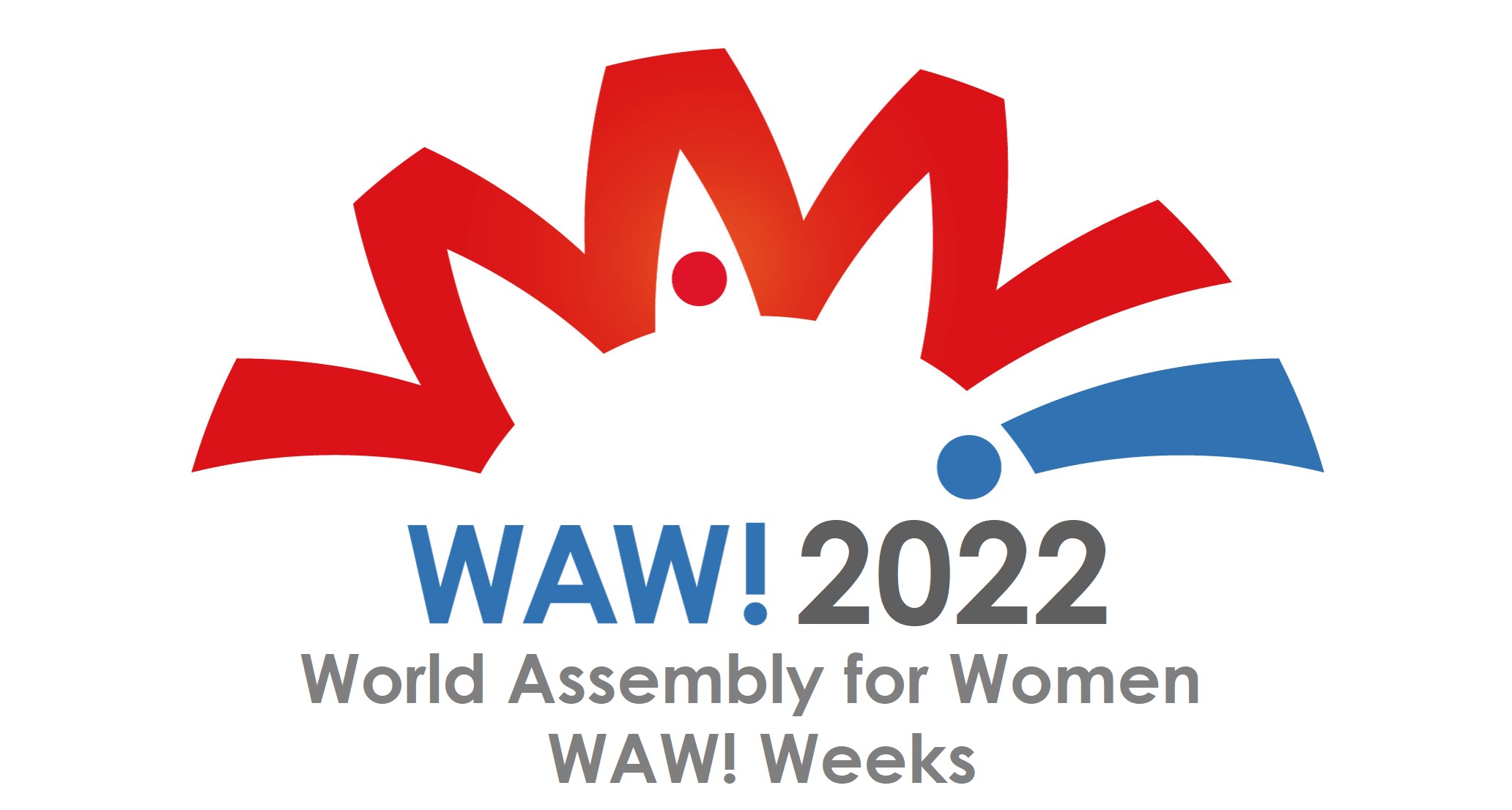
This seminar was a WAW! Weeks official side event of WAW!2022.
WAW!, or World Assembly for Women, is an international conference aiming to realize gender equality and women's empowerment domestically and internationally, which is one of the top priorities of the Government of Japan.
International Cooperation
- International Seminar
- FY2019 Seminar for Gender Equality Officers and Women Leaders in the Asia Region
- FY2018 Seminar for Gender Equality Officers and Women Leaders in the Asia Region
- FY2017 Seminar for Gender Equality Officers and Women Leaders in the Asia Region
- FY2016 Seminar for Gender Equality Officers and Women Leaders in the Asia Region
- FY2015 Seminar for Gender Equality Officers and Women Leaders in the Asia Pacific Region
- FY2014 Seminar for Gender Equality Officers and Women Leaders in the Asia Pacific Region
- FY2013 Seminar for Gender Equality Officers and Women Leaders in the Asia Pacific Region
- FY2012 Seminar for Gender Equality Officers and Women Leaders in the Asia Pacific Region
- FY2011 Seminar for Gender Equality Officer and Women Leaders in the Asia Pacific Region
- FY2010 Empowerment Seminar for Women Leaders in the Asia Pacific Region
- FY2009 Empowerment Seminar for Women Leaders in the Asia Pacific Region Final Report
- FY2008 Empowerment Seminar for Women Leaders in the Asia Pacific Region
- FY2007 Empowerment Seminar for Women Leaders in the Asia Pacific Region
- FY2006 Empowerment Seminar for Women Leaders in the Asia Pacific Region
- NWEC Global Seminar
- FY2025 NWEC Global Seminar: Addressing Technology-Facilitated Gender Based Violence (TFGBV): Approaches to Eradicate the Invisible Harm
- FY2024 NWEC Global Seminar: Gender Equality and Care
- FY2023 NWEC Global Seminar: Gender Mainstreaming & Strengthening Institutional Mechanism with Gender Perspective
- FY2022 NWEC Global Seminar: Does Digital Technology Advance Gender Equality?
- FY2021 NWEC Global Seminar: Combating Gender-Based Violence – “Building Back Better” from the Covid-19 Crisis
- FY2020 NWEC Global Seminar: Covid-19 and Gender
- FY2019 NWEC Global Seminar: Gender and Media
- FY2018 NWEC Global Seminar: Promotion of the Advancement of Women - What Japan can learn from Iceland about Gender Equality?
- FY2017 NWEC Global Seminar: Promotion for Advancement of Women Lessons from Germany
- FY2016 NWEC Global Seminar: Promotion for Advancement of Women –Lessons from Europe
- FY2015 International Symposium: Gender Equality and Women's Empowerment
- FY2014 International Symposium: Keys to Diversity and Women's Leadership
- FY2013 NWEC International Symposium:Gender Equality for Men
- FY2012 NWEC International Symposium:To Make a Society without Violence against Women a Reality
- FY2011 NWEC International Symposium
- FY2010 International Forum for Women's Empowerment
- FY2009 International Forum for Women's Empowerment
- FY2008 International Forum for Women's Empowerment Final Report3
- FY2008 International Forum for Women's Empowerment Final Report2
- FY2008 International Forum for Women's Empowerment Final Report1
- Cooperation with JICA
- FY2025 Knowledge Co-Creation Program (KCCP): "Promotion of Global Networking on Anti-Trafficking in Persons"
- FY2025 Knowledge Co-Creation Program "Eradicating Sexual and Gender-Based Violence (SGBV)"
- FY2025 Knowledge Co-Creation Program: Bangladesh “Strengthening Capacity to Address Gender-Based Violence"
- FY2024 Knowledge Co-Creation Program on "Promotion of Global Networking on Anti-Trafficking in Persons"
- FY2024 Knowledge Co-Creation Program "Eradicating Sexual and Gender-Based Violence (SGBV)"
- FY2023 Knowledge Co-creation Program "Promotion of Networking among ASEAN Countries on Anti-Trafficking in Persons”
- FY2023 Knowledge Co-Creation Program "Eradicating Sexual and Gender-Based Violence (SGBV)"
- FY2022 Knowledge Co-creation Program "Promotion of Networking among ASEAN Countries on Anti-Trafficking in Persons”
- FY2022 Knowledge Co-Creation Program "Eradicating Sexual and Gender-Based Violence (SGBV)"
- FY2021 Knowledge Co-creation Program "Promotion of Networking among ASEAN Countries on Anti-Trafficking in Persons”
- FY2020 Knowledge Co-creation Program "Promotion of Networking among ASEAN Countries on Anti-Trafficking in Persons”
- FY2019 Knowledge Co-creation Program "Promotion of Networking among ASEAN Countries on Anti-Trafficking in Persons”
- FY2018 Knowledge Co-creation Program "Promotion of Networking among ASEAN Countries on Anti-Trafficking in Persons”
- Issue-specific Training “Seminar on Promotiom of Networking among ASEAN Countries on Anti-Trafficking in Persons”
- Basic Information-Gathering Survey/Workshop Seminar on the Economic Independence for Women in Central America and the Caribbean (El Salvador/Dominican Republic)
- Regional Gender Seminar in Central and South America
- 2015 Issue-specific Training "Seminar on Promotion of Networking among Asian Countries on Anti-Trafficking in Persons"
- Seminar on the Promotion of Education for Girls and Women II
- International Conference/International Exchange
- Visit by Professor Hilado from the University of the Philippines Visayas
- Online meeting with Seisen International School elementary students
- Visitor: Mansfield Fellows
- Visitor:JICA Knowledge Co-Creation Program (KCCP) on "Women's Empowerment through Business for Central American Integration System (SICA) Member Countries"
- The 68th Session of the Commission on the Status of Women
- Visitor: Madam Sustjie Mbumba, First Lady of the Republic of Namibia
- Workshop of commemorating the donation of the Beate Shirota Gordon archive materials
- Meeting with Korean Women’s Development Institute (KWDI)
- The Coalition of Finnish Women's Associations (NYTKIS) Secretary General Ms. KAKKOLA’s Courtesy Call to Foreign Minister KAMIKAWA
- The Coalition of Finnish Women's Associations (NYTKIS) Secretary General Ms. KAKKOLA’s Japan Visit Program
- The 67th Session of the Commission on the Status of Women
- NGO CSW67 Forum
- Webinar with Korean Women’s Development Institute (KWDI)
- The 66th Session of the Commission on the Status of Women (Hybrid format)
- Online meeting with international graduate students from the Appropriate Technology course at the University of Tsukuba
- The 65th session of the Commission on the Status of Women
- Lecture "The Beate Sirota Gordon Archives at Mills College"
- Participation in 2nd AGenT
- The 64th session of the Commission on the Status of Women
- Dr. Wang from National Taiwan University visits NWEC
- Japan Network of Women Engineers and Scientists and The Japan Inter-Society Liaison Association Committee for Promoting Equal Participation of Men and Women in Science and Engineering: 9th Japan Korea China Women Leaders Forum for Science & Technology
- Researcher from the KWDI visits NWEC
- Visit by a delegation from the Socialist Republic of Vietnam Ministry of National Defense
- Briefing on the Reykjavik Index for Leadership
- Women's Archives Center Exhibition "Beate Sirota Gordon and gender equality in Japanese Constitution"
- Visit from the Guangxi Women’s Federation
- Participation in the 63rd Session of the Commission on the Status of Women
- 7th Global Forum on Gender Statistics
- FY2018 International Symposium hosted by Korean Institute for Gender Equality Promotion and Education “Gender Equality at Schools”
- Visit from All-China Women’s Federation(ACWF)
- Participation in the 62nd Session of the Commission on the Status of Women
- The 14th KIGEPE International Symposium “Empowering Women’s Leadership: expanding influence and innovation”
- Participation in the 61st Session of the Commission on the Status of Women
- Visit from the Batis Center for Women
- 2011 Asia Women Eco-Science Forum (a forum of science and engineering leaders in Japan, China and Korea)
- The 60th Session of the Commission on the Status of Women
- The 59th Session of the United Nations Commission on the Status of Women
- The 58th Commission on the Status of Women
- The 57th Session of the United Nations Commission on the Status of Women
- International Symposium: Gender Awareness Education for Sustainable Development
- Thirtieth Anniversary Programs
- Attendance at the Ceremony Commemorating the 25th Anniversary of the Korean Women’s Development Institute (KWDI)
- Japanese-Filipino children (JFC)* from the Philippines-based NGO “DAWN” visit the Center
- Visitors from Abroad to NWEC
- Research report on Multicultural Family Support in South Korea
- Workshop on Gender and Education: Life-long Learning for Women’s Empowerment
- Lecture Delivered by a Visiting Researcher
- Connections: Bringing Together the Next Generation of Women Leaders in Science, Technology, Engineering and Mathematics
- Conclusion of Memorandum of Understanding on Exchange and Cooperation with the Ministry of Women's Affairs, Royal Government of Cambodia
- Visit to Japan by the Minister of Women’s Affairs of the Royal Government of Cambodia
- KIGEPE Delegation Visit
- Officials of Ministry of Information and Communications of the Socialist Republic of Vietnam visited NWEC
- The 56th Commission on the Status of Women
- Dr. Barker's visit
- Multidisciplinary Intellectual Exchange for Women Leaders from the United States, Japan, South Korea and the Philippines
- Courtesy visit to University of Hawai`i
- Delegation of Board for the Advancement of Women, Ministry of Finance of the Socialist Republic of Vietnam visited NWEC
- Visit Korean Women's Development Institute (KWDI)
- Report on Participation in the 5th World Social Forum on Migration
- A group led by the Vice President of the Korean Women's Development Institute visited NWEC
- A disaster management specialist from India visits the Center
- Visit to the Korean Institute for Gender Equality Promotion & Education (KIGEPE) and others
- Secretary of State, Ministry of Justice, Kingdom of Cambodia visited NWEC
- Research conducted in the Republic of the Philippines
- Research on the Comparative Study of the Gender Equality Policy in Southeast Asian Countries in the Kingdom of Cambodia
- Ochanomizu University and A Canadian Women’s Study Researcher visited NWEC
- Aigyung Yang, Research Fellow and Former Director of Strategy Board for Women Friendly Policies of the Korean Women's Development Institute (KWDI) Visits NWEC
- Delegation of the Ministry of Defense of the Socialist Republic of Vietnam visited NWEC
- Delegation from the Women and Development Center, of the Vietnam Women's Union, Visited NWEC
- The "7th Asia-Pacific Forum on Development and Gender" was held in Seoul, South Korea
- HOME
- International Cooperation
- NWEC Global Seminar
- NWEC Global Seminar
- FY2022 NWEC Global Seminar: Does Digital Technology Advance Gender Equality?

